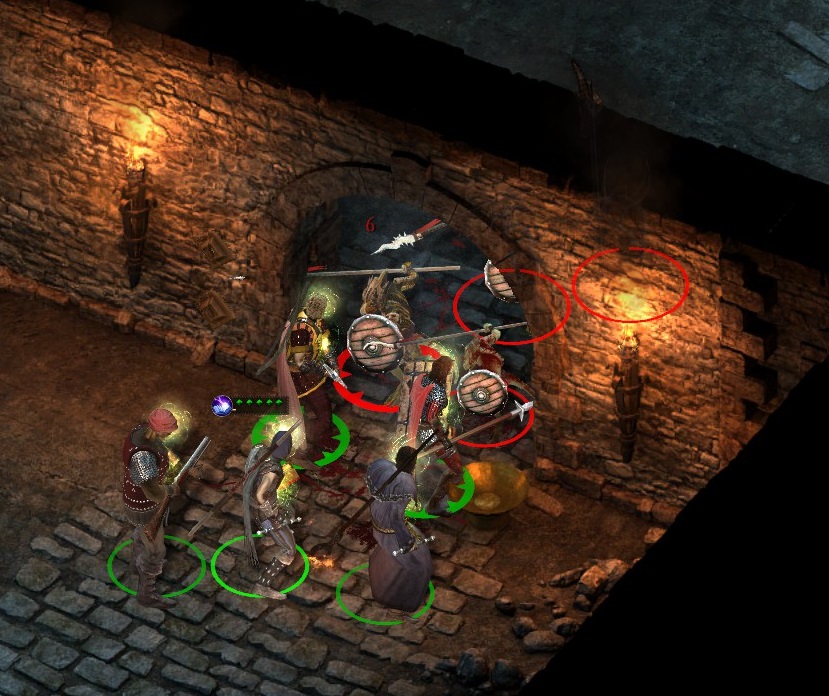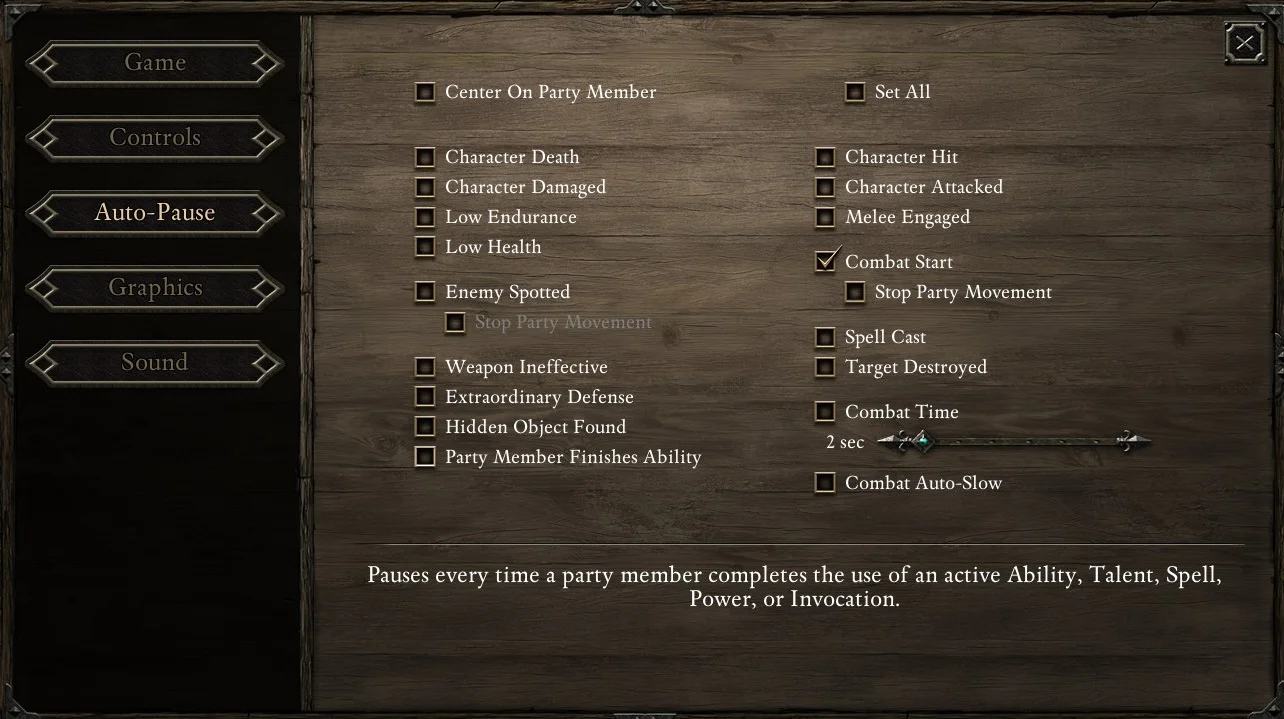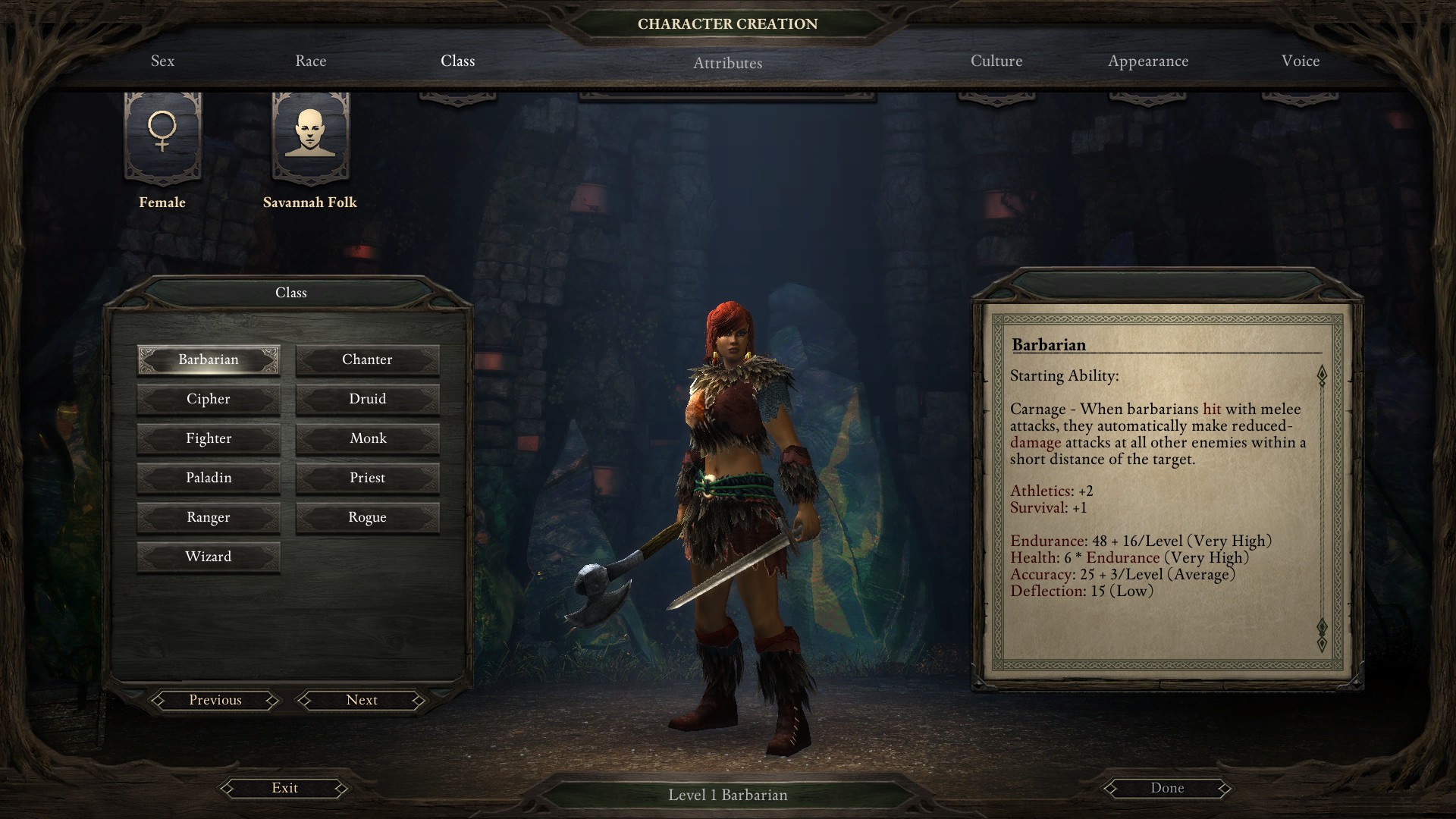Pillars of Eternity is to Baldur's Gate what Wasteland 2 was to the old Fallout games - and Wasteland 1, of course. It's a nice throwback to old school RPGs mixed up with new systems and mechanics. I had a good time with it, but I feel like I had an even better time with Wasteland 2. Some of the systems in PoE were too complex. the story felt too verbose at times and the level progression was slow and somewhat unrewarding. I have to preface all of this with the disclaimer that I haven't played any of the older games because I also found them a bit too dense for my tastes.
I always enjoy character creation in RPGs, you have plenty of things to figure out even if it's the first time you're playing and the game expects you to absorb all of the lore and mechanics they have written. The game at least suggests where you should put your points into, based on your class, but features - like spells and special abilities - are up to you. I decided to play a paladin and take healing and defensive abilities. There is a wide array of races and classes, but some are a bit easier to play than others; Straightforward barbarians require less management than Chanters - spellcasting units that cast weaker spells in order to use bigger ones.
I then tweaked the options to my liking; Characters would be bloody before dying, you would be able to access your stash from everywhere - alloying you to literally pick up everything you find and put it in a magic box - I would see the stat requirement for conversation choices and also the 'attitudes' associated with them. I find these options a bit weird; Is the game better with or without infinite inventory space? Aren't you discouraged from roleplaying your character if the 'good' choices are already highlighted for you? I suppose it's a matter of choice from the player, but the way I played was impacted by these options. I also left the auto-pause stuff as it was, because I wasn't sure what I would need.
Most of your time in PoE will be spent moving around, talking to people, getting quests and fighting monsters. Moving around is pretty easy with the relatively small scale of the maps and the quickly used speed settings that allow you to make everything go much rapidly. You can also sneak around, which slows you down but allows you to detect traps. There wasn't an option for 'pause on trap found', so my characters mostly discovered big traps that spanned a huge portion of a room, and then stepped on it before I could command them to disarm them. Sneaking can also be used to get closer to enemies before combat start and it's quite useful to disarm trapped chests. You can also hold the tab key to highlight everything in the world you can interact with, from NPCs to things you can gather. I wish there was a toggle, because I'm going to hold it all the time while exploring the wilderness, trying to find stuff to grab. Another small little thing that bothered me was how I would often think I had my whole party selected, only for one character to actually move when I clicked.
Talking to people involves many screens of text, with most of the story being told and not shown. Some choices require you to have certain attributes, other are more aligned with the attitude of your character (Honest, Clever, Cruel, and so forth). Some actions, like climbing a rope to get a dragon egg or jumping down a huge pit are also treated like choose-your-own-adventure segments where you interact with the world via text screens. They're pretty fun, although the allure of re-loading after bad decisions were taken was strong for me. Otherwise the way the story goes is pretty much like you want it to, there are usually multiple sides to a conflict and you can select which one fits better with your character, or just flip back and forth when the opportunities arise. As a paladin, I had to keep my attitude between Passionate and Clever - in order to gain bonuses from my skills - so these choices were pretty much taken for me.
There are plenty of other things you can do; from repairing an old castle to it's former glory to crafting, cooking and enchanting, doing sidequests for your party members or just things you pick up from NPCs here and there. There is never a dull moment in Pillars of Eternity. Some choices are tougher than others - like that time I jumped into that pit and couldn't climb out and a dragon was blocking the easy way out so I had to fight my way out to the surface and that took forever and I had full party wipes. Much like this event, PoE will probably leave you some cool stories to remember. That being said, most of these stories will probably involve combat, and the combat system was for me the weakest link in PoE, even though the potential for greatness was there. The health/endurance system they use is ingenious - your endurance is depleted during combat but regenerates after they're over, you have more health but it doesn't come back without resting, when your endurance falls to 0 you get knocked out - but I didn't understand well how health and endurance were linked. What determines how much health you lose from an attack if you also lost endurance? Is it a percentage value? Influenced by some other stat? The game is usually so rich in detailed information about its systems that I was a bit sad to not see it.
Battles are big messes. Your characters have almost no intelligence of their own and you have six of them to manage. I would've enjoyed this game way more with a party size of two or three, but six is just too much. First of all, they will stand around stuck in door frames, unable to get to enemies and attack them if you don't manually move them around the right way. You have plenty of abilities to use, some - like the paladin's lay on hands - can be used multiple times per encounter, others like spells have a restricted daily usage count that can only be replenished by taking a rest. Your party will never ever use its abilities, even the 'free' ones, by itself. There is no way to setup them so they fight efficiently without you needing to pause the game and select actions for everyone every time. My priest could have used its healing aura when people around him were sufficiently hurt. My mage had two free blasts of energy per fight. My fighter could knock down enemies. Only the Chanter automatically uses strings of skills during fights, but even then you have to manually select the finishing move. I wish the game would allow you to set AI patterns so your party would at least do some cool stuff on its own. As it was, I just auto-attacked all the time.
Even if I took the time to cast spells or use abilities - which I needed in tougher fights - characters didn't revert to doing what they were beforehand. The priest that just healed its party stood there, motionless, instead of resuming its auto-attacks from before. When your characters kill an enemy, they'll move to the next automatically, why don't they do more things by themselves? Most fights were pretty straightforward, but others had me 'cheese' the game by placing people in doorways to block them. I also was often overwhelmed by the amount of stuff going on in the combat log and the number of buffs/debuffs that a character can get. Accuracy ratings, damage reduction, raw damage, the list of systems goes on, making this a fairly complex game that you can delve pretty deeply into, but that's not exactly what I was looking for in my RPG time. You also level up fairly slowly and gaining a few points in some skills that you might never use and choosing feats that only increase numbers on your character sheet doesn't feel like the most rewarding thing. I wish there were more class features that would change the way you tackle fights.
Pillars of Eternity is amazing in what it does, which is to say building a full world complete with complex mechanics and characters, lore and legend a-plenty, gear and treasures, classes and races to mix and match your party, but all too overwhelming and dense for me right now. I'd still recommend it in a heartbeat to any RPG fan, because it might be their cup of tea, and what a perfect cup that would be.













